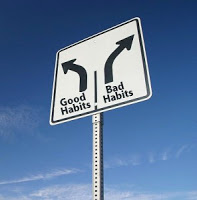“Ah-Choo!”
Yesterday the lady in the pew in front of me sneezed. I watched her automatically cover her reaction by sneezing into the bend of her arm. Coughing into our sleeves has become the acceptable and proper way to sneeze. A proven way to control the spread of disease.
Why even you-tube has a video telling the history of this new habit sweeping across the world.
Doesn’t it seem like just yesterday we were all sneezing and coughing into our hands? How did we switch to this better alternative so quickly?
Why are some good habits adopted faster than others?
Why can’t I consistently exercise and eat healthy as easily as I have learned to cough into my sleeve?
I have lots of questions and not too many answers, but this got me thinking about habits. Actually I spend some time reading and researching interesting facts about habits.
A New York Times article, based upon the research by Andy Ryan says:
“Rather than dismissing ourselves as unchangeable creatures of habit, we can instead direct our own change by consciously developing new habits. In fact, the more new things we try — the more we step outside our comfort zone — the more inherently creative we become, both in the workplace and in our personal lives.
But don’t bother trying to kill off old habits; once those ruts of procedure are worn into the hippocampus, they’re there to stay. Instead, the new habits we deliberately ingrain into ourselves create parallel pathways that can bypass those old roads.”
Mark Twain wrote, “Habit is habit, and not to be flung out of the window by any man, but coaxed downstairs a step at a time.”
In my readings I found that the popular belief of it takes 21-30 days to adopt a habit is a myth. The length of time depends on who’s trying and what they are trying to do. The time range varies from 18-254 days. However, on average it took 66 days to make a habit stick. The same study found that if you miss a day here or there, it does not affect the habit-forming process. Most important is the ability to keep going, even if you hit a setback or return to the unwanted habit.
Did coughing in our sleeves catch on because it affects others beside myself? If so, shouldn’t fastening your seatbelt, not drinking and driving, and driving the speed limit do the same?
Was it society’s amount of positive reinforcement to cough into our sleeves that this habit took off with lightening speed? A positive peer pressure?
Do you think one simple movement is easier to adopt than a more complex one? Could that be a reason?
Some habits get well established when a trigger is identified. A trigger is an event that will kick off that automatic urge to do a habit. Habits become automatic after we’ve created a bond between the trigger and the habit — the stronger the bond, the more ingrained the habit.
A sneeze is definitely a trigger.
Our spiritual walk can be filled with wonderful healthy habits, such praying, bible study, contemplation, and serving others. Maybe the spiritual habits I want to develop more consistently need more triggers?
A lady sneezed and instead of spreading germs, she stretched my curiosity about habits.
What good habits would you like to develop? Why do you think some habits are more difficult than others? Good topic to discuss and share.


Do you think it is this time of year that also makes us think about old habits? Fall is a time of shedding the old, preparation.
The more I think about it the more I think peer pressure has lots to do with how we change. People began smoking less when society no longer accepted it. Coughing into our sleeve is the same I guess. Still makes me think about the habits I do want to cultivate in new light.
I also am looking at some old habits that need changing. I agree there is a trigger that goes off in our mind that causes us to just switch our thinking. I wish it was just knowing that it’s a sin or that God asked us to, but some habits are tougher than others! Pray, pray, pray!
So true, we copy what we see by our peers. So hopefully your hanging around a good bunch people. Nice post Mrs. Jean. Read mine if you wish! I’m A Christian Writer
Very good food for thought, Jeanie. I’ve been thinking about this alot lately, as I’m trying to get into some good, established writing habits, but I keep getting derailed. Part of it is out of my control — kid, family obligations, but part of it is just not being disciplined. I think there’s a lot of reasons for having trouble establishing good habits — but mainly because it usually requires us to give up something that we like — comfort, relaxation, free time, etc. Only with God’s help! ;0)
Tweeting this!
I love the idea of building parallel pathways to get around old habits. I’m going to think more about how I can do this with several habits I’d like to break/start up. Thank you!
I think peer pressure definitely helps. It can be a positive or negative influence on our lives, depending on who we surround ourselves with. I’ve been making an effort for some time now to ingrain some things in my brain. So far–keeping a consistent routine (sometimes having to force myself) has been working. One slip though, and I know I’m in trouble!
I think it helps a bunch that sneezing into any other place (hand, air) will get you some pretty nasty looks! Peer pressure helps, especially when it’s right there in our faces.
Found you via Tweet Me Tuesday!